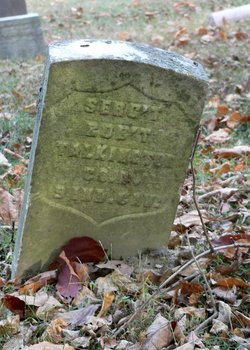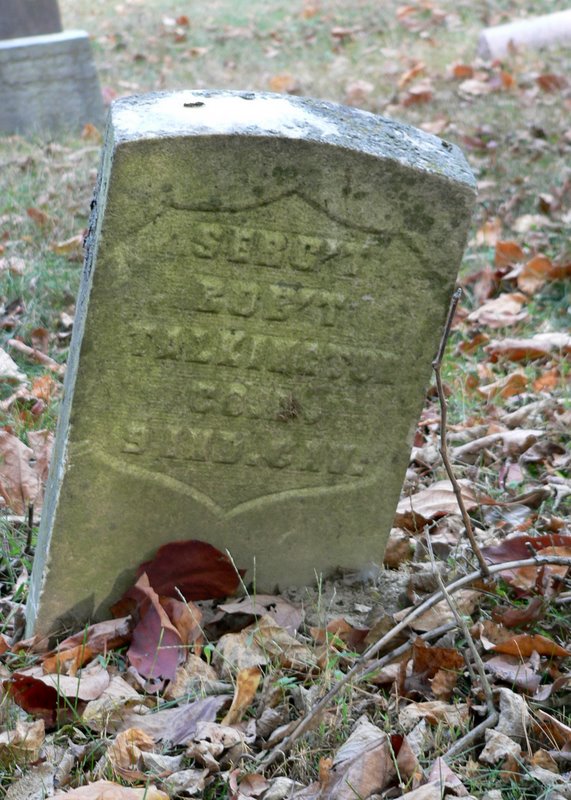He survived the sinking on the Mississippi River of the Steamship Sultana on 27 Apr 1865, seven miles north of Memphis, TN when three of the ship's four boilers exploded.
The 260-foot ship was much smaller that the famous Titanic but lost many more passengers. It was a civilian steamship carrying mostly military passengers on a contract basis of $5.00 per person.
The disaster received somewhat diminished attention because it took place soon after the assassination of President Lincoln and the closing weeks of the Civil War.
Most passengers were Union Soldiers on their way home from Confederate prison camps.
Many were weakened by malnutrition and disease from their many months of imprisonment at Andersonville and Cahaba prisons.
There were about 2,400 passengers and crew aboard which was six times the legal limit. Of this number 1,800 men, women and children died.
The army units from Ohio lost the most men at 791. Tennessee was next with 514, then Indiana at 459, Michigan with 310 and Kentucky at 194. Token numbers were lost from Virginia, Illinois, Iowa and Pennsylvania.
Several books have been written about the disaster.
Sgt. Talkington told his eye-witness story to a nephew (Edgar Talkington) that was published on Page 123 of the Indiana Historical Bureau BULLETIN, Volume 32, Number 7, July 1955. To quote his highlights:
--------------------------
"I was captured with my entire squad and was taken to the Libby prison. After a short stay there I was removed to another point further south, Cahaba, Alabama.
I was held in the barracks for a time and later put on construction work. Being an expert in my line of work I was a little better treated than a lot of others, and was paid fifteen to twenty dollars per day in Confederate currency. This was worth very little compared to greenbacks, probably ten to one.
After several months of this kind of work I was paroled with hundreds of other prisoners in exchange for southern prisoners who were in northern camps.
On April 24, 1865, about 2,000 of us were received on the Sultana at Vicksburg.
We steamed upstream to Memphis, Tennessee, where we took on more passengers and coal.
We left Memphis about mid-night. There were so many on the boat that quarters for sleep or rest were very scarce. Each person had to bunk as he could. There was a dead northern officer on the forward part of one deck, almost over the boiler room. I told someone that I was going to hold that officer down for the rest of the night.
We had proceeded about ten miles north of Memphis and it was about two o'clock in the morning of April 27. I was awakened by a loud crushing noise. I was in the midst of a dense cloud of hot steam and realized I had been scalded but how bad I did not know. The steam was so hot I could scarcely breathe.
I groped my way out of this place as quickly as I could. It took me a moment to realize what had happened. A boiler had blown up. Within a few minutes the ship caught fire.
Since I never could swim I did not intend to leave the boat as long as I could stay on. The current kept sweeping men away from the boat and more kept going overboard.
The fire was spreading rapidly from the forward end of the boat and only a few of us were left on board. The back part of the boat was getting pretty hot so I began to consider taking to the water.
I procured a piece of timber about two by four by four or five feet long. I removed all my clothing except my underclothes and socks, and with this as my only support dropped into the water.
The river was very high from spring rains and there was much debris in the river. It had been raining, was still cloudy, and I never saw a darker night.
In this manner I floated past Memphis. I could see the lights as I went by but was so far out I knew there was no use to call for help.
About twelve miles below Memphis I floated nearer the shore. There was an army post at a small town there. I began to cry for help. Someone heard me and answered back. We called to each other several times, then I heard someone throw an oar into a rowboat. I thought at the time that was the best sound I had ever heard.
They hauled me into the boat and landed me safely in the little town I had just passed among Union soldiers and friends. After about two weeks I was released and sent home."
In 1880 he was granted an invalid pension Application # 406193, Certificate #391216.
At the age of 76 he was admitted to the U.S National Home for Disabled Volunteer Soldiers at Marion, Grant County, IN.
In 1903 he was given a pension for his helpless and dependent daughter Nina Talkington.
He first married Rebecca McGinniss on 3 Jul 1850 and they had three children Margaret L. Talkington Black (1857-1923), Inez Nina Talkington (1851-1921), and Kate Talkington (1852-). Rebecca was a cousin of General George McGinniss, who was later Postmaster of Indianapolis.
His second marriage was to Nancy J. Berkshire Talkington.
He survived the sinking on the Mississippi River of the Steamship Sultana on 27 Apr 1865, seven miles north of Memphis, TN when three of the ship's four boilers exploded.
The 260-foot ship was much smaller that the famous Titanic but lost many more passengers. It was a civilian steamship carrying mostly military passengers on a contract basis of $5.00 per person.
The disaster received somewhat diminished attention because it took place soon after the assassination of President Lincoln and the closing weeks of the Civil War.
Most passengers were Union Soldiers on their way home from Confederate prison camps.
Many were weakened by malnutrition and disease from their many months of imprisonment at Andersonville and Cahaba prisons.
There were about 2,400 passengers and crew aboard which was six times the legal limit. Of this number 1,800 men, women and children died.
The army units from Ohio lost the most men at 791. Tennessee was next with 514, then Indiana at 459, Michigan with 310 and Kentucky at 194. Token numbers were lost from Virginia, Illinois, Iowa and Pennsylvania.
Several books have been written about the disaster.
Sgt. Talkington told his eye-witness story to a nephew (Edgar Talkington) that was published on Page 123 of the Indiana Historical Bureau BULLETIN, Volume 32, Number 7, July 1955. To quote his highlights:
--------------------------
"I was captured with my entire squad and was taken to the Libby prison. After a short stay there I was removed to another point further south, Cahaba, Alabama.
I was held in the barracks for a time and later put on construction work. Being an expert in my line of work I was a little better treated than a lot of others, and was paid fifteen to twenty dollars per day in Confederate currency. This was worth very little compared to greenbacks, probably ten to one.
After several months of this kind of work I was paroled with hundreds of other prisoners in exchange for southern prisoners who were in northern camps.
On April 24, 1865, about 2,000 of us were received on the Sultana at Vicksburg.
We steamed upstream to Memphis, Tennessee, where we took on more passengers and coal.
We left Memphis about mid-night. There were so many on the boat that quarters for sleep or rest were very scarce. Each person had to bunk as he could. There was a dead northern officer on the forward part of one deck, almost over the boiler room. I told someone that I was going to hold that officer down for the rest of the night.
We had proceeded about ten miles north of Memphis and it was about two o'clock in the morning of April 27. I was awakened by a loud crushing noise. I was in the midst of a dense cloud of hot steam and realized I had been scalded but how bad I did not know. The steam was so hot I could scarcely breathe.
I groped my way out of this place as quickly as I could. It took me a moment to realize what had happened. A boiler had blown up. Within a few minutes the ship caught fire.
Since I never could swim I did not intend to leave the boat as long as I could stay on. The current kept sweeping men away from the boat and more kept going overboard.
The fire was spreading rapidly from the forward end of the boat and only a few of us were left on board. The back part of the boat was getting pretty hot so I began to consider taking to the water.
I procured a piece of timber about two by four by four or five feet long. I removed all my clothing except my underclothes and socks, and with this as my only support dropped into the water.
The river was very high from spring rains and there was much debris in the river. It had been raining, was still cloudy, and I never saw a darker night.
In this manner I floated past Memphis. I could see the lights as I went by but was so far out I knew there was no use to call for help.
About twelve miles below Memphis I floated nearer the shore. There was an army post at a small town there. I began to cry for help. Someone heard me and answered back. We called to each other several times, then I heard someone throw an oar into a rowboat. I thought at the time that was the best sound I had ever heard.
They hauled me into the boat and landed me safely in the little town I had just passed among Union soldiers and friends. After about two weeks I was released and sent home."
In 1880 he was granted an invalid pension Application # 406193, Certificate #391216.
At the age of 76 he was admitted to the U.S National Home for Disabled Volunteer Soldiers at Marion, Grant County, IN.
In 1903 he was given a pension for his helpless and dependent daughter Nina Talkington.
He first married Rebecca McGinniss on 3 Jul 1850 and they had three children Margaret L. Talkington Black (1857-1923), Inez Nina Talkington (1851-1921), and Kate Talkington (1852-). Rebecca was a cousin of General George McGinniss, who was later Postmaster of Indianapolis.
His second marriage was to Nancy J. Berkshire Talkington.












